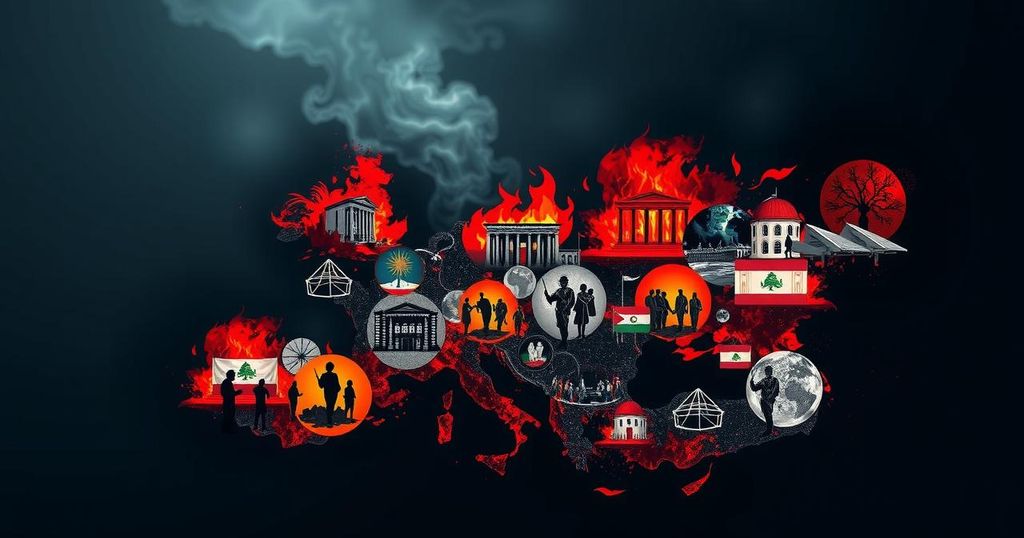Humanitarian worker deaths are at an all-time high in 2024. Gaza, Lebanon, Haiti, Ukraine, and Guinea are experiencing severe humanitarian crises due to ongoing violence, displacement, and natural disasters. The UN stresses the urgent need for safety and support for aid workers, while humanitarian conditions continue to deteriorate across these regions, particularly as winter approaches.
The world is witnessing a disturbing increase in violence against humanitarian workers, with 281 fatalities recorded in 2024—the most deadly year to date. The humanitarian crises span several global hotspots, including the Occupied Palestinian Territory, Lebanon, Haiti, Ukraine, and Guinea, each presenting dire situations necessitating urgent aid. In Gaza, violence has led to the destruction of shelters and critical humanitarian access issues. Meanwhile, Lebanon faces intensifying airstrikes causing civilian casualties and impacts on healthcare. Haiti grapples with internal displacement due to armed violence. Ukraine experiences heightened humanitarian needs amidst ongoing conflict, particularly as winter sets in. Lastly, Guinea is confronting floods necessitating emergency relief efforts.
The devastation of humanitarian worker deaths is underscored by an alarming report from the United Nations Office for the Coordination of Humanitarian Affairs (OCHA), which notes that aid workers are being killed at an unprecedented rate due to escalating conflicts, particularly in Gaza, where over 320 humanitarian personnel have died since October 7, 2022. The Assistant Secretary-General for Humanitarian Affairs, Tom Fletcher, emphasized that such violence against workers serving the most vulnerable populations is intolerable, urging protection under international law.
In the Occupied Palestinian Territory, ongoing Israeli military operations disproportionately affect civilians and humanitarian efforts. Recent airstrikes resulted in significant casualties and even further destruction of basic infrastructures such as shelters, exacerbating the humanitarian crisis for thousands of Palestinian families. With winter approaching, the need for adequate shelter grows more critical, yet supplies remain severely restricted amidst the conflict.
Lebanon is experiencing severe fallout from airstrikes as well. The OCHA reported that intense airstrikes have led to death and destruction across civilian areas. Documentation from the World Health Organization indicates at least 137 attacks on healthcare facilities, with many casualties occurring among both health personnel and patients. OCHA advocates for the protection of medical staff amid escalating violence.
In Haiti, violence from armed groups has displaced over 40,000 individuals in the Port-au-Prince region since mid-November, complicating humanitarian efforts. Water, sanitation, and health services face increasing demand as displaced communities strain limited resources.
Ukraine remains in a state of disarray, especially in front-line regions where infrastructure has been heavily bombarded as combat continues. Significant efforts by humanitarian organizations provide essential winter supplies to affected populations, with ongoing deliveries of aid crucial as temperatures drop.
Finally, Guinea’s recent flooding crisis has prompted emergency funding from the UN Central Emergency Response Fund, which aims to assist approximately 60,000 individuals in need of health, food, and educational support following significant displacement and infrastructural damage.
The ongoing global humanitarian crises have led to increasing mortality rates among aid workers, a concerning trend highlighted by various reports from humanitarian organizations. The UN’s OCHA has indicated that various regions are facing extreme challenges, including the Occupied Palestinian Territory, where military conflicts persist, and the deterioration of humanitarian conditions prevails. Lebanon’s security and health infrastructures are severely under threat, while Haiti faces rampant violence causing mass displacement. In Ukraine, persistent conflict exacerbates an already strained humanitarian situation as winter approaches. Guinea is grappling with natural disasters that further complicate the operational landscape for humanitarian efforts. These interconnected crises highlight the urgent need for global attention and coordinated responses to protect vulnerable populations and those who assist them.
In summary, the world is witnessing an unprecedented escalation of humanitarian crises characterized by increasing threats to aid workers and severe challenges in regions like Gaza, Lebanon, Haiti, Ukraine, and Guinea. Efforts to deliver aid face significant barriers due to conflict and natural disasters, with substantial needs emerging as climate and security situations worsen. A concerted global effort is necessary to address these issues, protect those delivering aid, and ensure the survival of vulnerable populations affected by these crises.
Original Source: www.unocha.org







